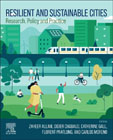
Resilient and Sustainable Cities: Research, Policy and Practice
Allam, Zaheer
Chabaud, Didier
Gallagher, Catherine
Pratlong, Florent
Moreno Cabrera, Juan Carlos
The disinvestment in public health agencies and the workforce following the 2008 financial crisis has been well-described. Resilient and Sustainable Cities: Research, Policy and Practice explores how these cuts impacted the ability of public health to respond to the pandemic. The topics include what is population health during a pandemic and how is it different that clinical medicine; federal, state, and local response to COVID-19; testing for COVID-19; implementation of public health control measures; use of public health emergency powers; addressing health equity; resignation and firing of public health leaders; vaccination planning; the future of public health after COVID-19. Written for leaders and practitioners working in public health practice and academia, as well as students in public health undergraduate and graduate level programs. Clarifies the role of public health in a pandemic emergency Assesses the indirect impacts of the COVID-19 pandemic, which include excess deaths from dementia, diabetes, and heart disease, and will soon include the potential for global epidemics of preventable diseases like measles, diphtheria, and polio Explores the impacts of the lack of trust in science and public health leadership Describes a way forward for a public health system prepared to respond to future threats INDICE: 1. What is a Population Health Approach2. Federal, State, and Local Public Health Roles3. Implementing Public Health Control Measures4. Standing up Testing5. Measuring the Impact of COVID-196. Equity7. Vaccines vs. Vaccinations8. Will the damage to public health be lasting?9. The future of the public health workforce
- ISBN: 978-0-323-91718-6
- Editorial: Elsevier
- Encuadernacion: Rústica
- Páginas: 496
- Fecha Publicación: 01/11/2022
- Nº Volúmenes: 1
- Idioma: Inglés
